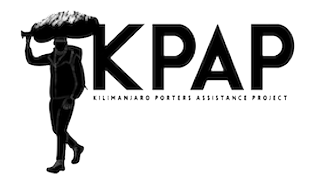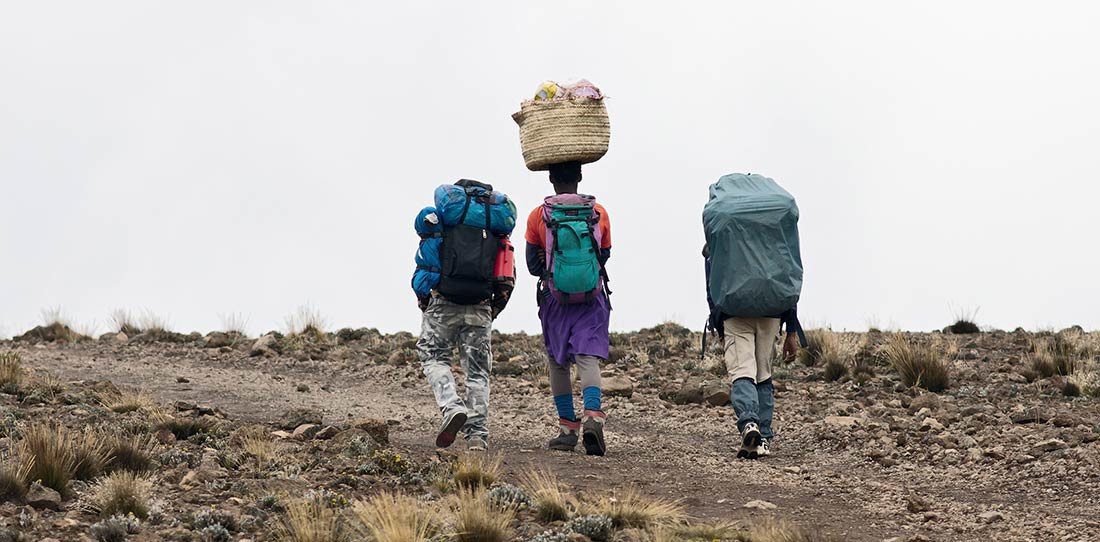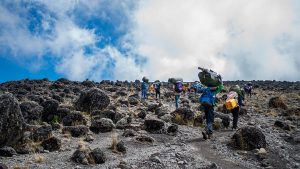If you have already climbed Mount Kilimanjaro you know that the porters are the heart and soul of your journey. Without their hard work, strength, and dedication the trek to the summit would be reserved for only the fittest and most hardcore peak-baggers. If you are yet to go, you’ll be amazed at the backbreaking work that the porters perform every day on Mount Kilimanjaro.
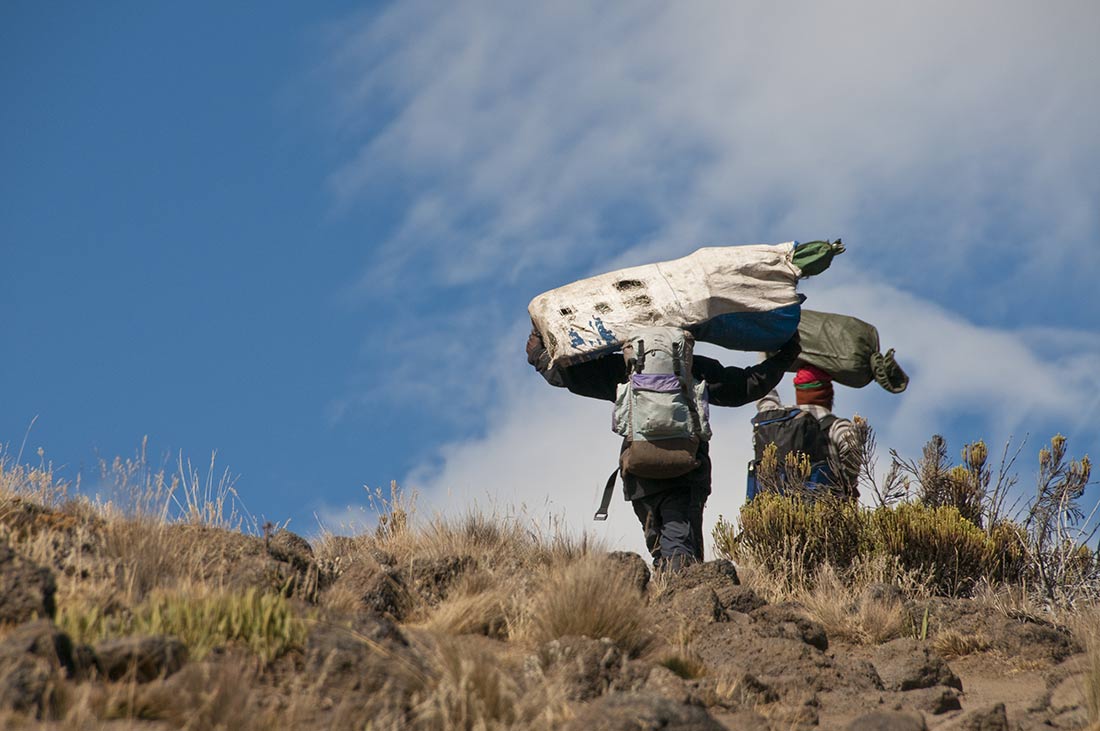
Furthermore, despite what you might think when you watch them, they are not indestructible and several die every year on Kilimanjaro. Most of the time it is from exposure due to their lack of adequate clothing. This problem is mostly caused by the budget operators.
Types of Operators
There are three main types of operators on Kilimanjaro. They are Luxury, Mid-Range, and Budget. The Luxury and most Mid-Range operators take care of their porters. However, it is the budget operators that are known to treat the porters poorly. Since the park fees, permits, etc. all cost roughly the same for all operators, the way budget operators cut costs is by providing only one meal a day and tattered clothing for their porters. Additionally, porters are not supposed to carry more than 33 pounds. But many carry much more.
To ensure the safety and well-being of these assiduous mountain crews, we have made it a point to be a member of the Kilimanjaro Porters Assistance Project (KPAP).
WHAT IS KPAP?
KPAP is a registered Tanzanian non-profit organization, They have been operating since January 2003. It is an initiative of the International Mountain Explorers Connection, a nonprofit organization based out of Boulder, Colorado in the United States.
KPAP was founded after seeing the horrendous conditions these porters had to endure. They recognized the value of the demanding labor these porters perform and wanted to improve the conditions under which they perform them.
THE MISSION OF KPAP
KPAP’s Mission is to improve the working conditions of the porters on Kilimanjaro by
- Make available appropriate climbing gear for any mountain crew to borrow.
- Offer educational opportunities to motivate and empower porters as funding allows.
- Raise public awareness regarding proper working conditions and treatment of porters on Kilimanjaro.
- Provide clients with the fundamental information necessary to choose a socially responsible climbing company.
Many times budget operators will say they are members of KPAP just to book clients. There is no way to stop them from putting a KPAP logo on their website. Therefore, do your homework when you are looking for a Kilimanjaro Operator. Here is a list of all the operators who are members of KPAP.
IMEC PORTER GUIDELINES
The International Mountain Explorers Connection (IMEC) has instituted a Partnership for Responsible Travel Program. This program is based on the Proper Porter Treatment Guidelines established by the Kilimanjaro stakeholders.
KPAP monitors the Kilimanjaro operators to make sure they comply with the Guidelines for Proper Porter Treatment.
HOW IS KPAP DIFFERENT FROM A PORTER’S UNION?
The Kilimanjaro Porters Assistance Project is a legally registered non-profit organization. KPAP is not a porter membership organization or a tour operator, and they do not collect fees from porters or climbing companies.
KPAP is helping to improve the working conditions of the porters by:
1. Lending donated clothing to porters—at no charge—for their climbs on Kilimanjaro.
Since 2005 over 25,000 porters have received proper mountain climbing clothing and equipment through KPAP’s Clothing Lending Program.
2. Providing free classes for the mountain crew.
- More than 9,000 mountain crews have participated in KPAP’s classes in English, HIV/AIDS Awareness, and Money Management.
- 65+ porters and guides have been trained as First Aid Instructors to conduct First Aid certification for crew members.
- 1,300+ crew members have been certified in First Aid since 2006.
- 5,000+ porters have attended KPAP’s Porter Rights Class through grant funding provided by the Tanzania Foundation for Civil Society.
- 110+ mountain crew have participated in Leave No Trace environmental preservation workshop.
3. Educating the public on porter working conditions and providing Guidelines for Proper Porter Treatment.
The public education component has been instrumental in facilitating improvements in the working conditions of the porters. Climbers are provided with fundamental information important in choosing socially responsible climbing companies.
4. Gathering information on company practices through the collection of porter surveys.
Monitoring Partner for Responsible Travel Company performance to ensure adherence to Proper Porter Treatment Guidelines through:
- Porter Questionnaires
- Interviews of porters
- Climber Survey reports
- Review of Client Briefing Information
- Observation of Company’s tipping procedure
- Examination of Company’s salary distribution methods
- Surveillance by a KPAP porter representative working as a porter on the climb
- KPAP advocates for the standards agreed upon by the following Kilimanjaro stakeholders:
- The Ministry of Natural Resources and Tourism
- TANAPA – Tanzania National Parks
- KINAPA – Kilimanjaro National Parks
- Tour Operator Associations
- Guide and Porter Associations
RECOMMENDED GUIDELINES FOR PROPER PORTER TREATMENT
- Wages Debate regarding the minimum wages for the crew continues.
- TANAPA claims a rate of $10/day for the porters posted on the website June 2008
- Government Notice No. 228 of 29th June 2009 indicates $10/day
- A present-day minimum wage has not yet been formally announced
- KPAP advocates for the wage accepted by the Porter Unions
- Loads carried for the climbing company should not exceed 20 kg.
- Porters receive the full amount of tips intended for them.
- Porters are outfitted with proper clothing and equipment.
- They have proper shelter and sleeping equipment.
- Porters are provided at least 2 meals/day and access to water.
- Sick or injured porters are properly cared for.
TIPPING
Above all, tipping is an important part of the compensation to the crew for a climb. The tipping amounts that are suggested would provide an appropriate living wage for the mountain crew. Certainly, we are aware that tipping may not be a common practice in some countries. However, it does play a part in the financial compensation for your Kilimanjaro climb crew. Therefore, we encourage climbers to consider tipping. It should be based on the crew meeting your expectations.
Below is a chart that gives a tipping estimate based on group size and the number of days.
| GROUP SIZE | 6 DAYS | 7 DAYS | 8 DAYS | 9 DAYS |
|---|---|---|---|---|
| 1 | $350 – $380 | $400 – $430 | $450 – $480 | $500 – $530 |
| 2-3 | $275 – $305 | $305 – $345 | $340 – $370 | $375 –$415 |
| 4+ | $200 – $230 | $220 – $250 | $245 – $275 | $270 – $300 |
This tipping procedure conforms to the guidelines set forth by the Kilimanjaro Porters Assistance Project. We have found this to be the most practical and transparent method for tipping.
For example, if you don’t know the size of your group, you can use this KPAP guideline to decide how much to tip:
- Guide: $25 per day
- Assistant Guide: $25 per day
- Cook: $15 per day
- Summit Porter $15 per day
- Porter: $10 per day
Finally, just remember to treat your porters well. If it wasn’t for them, you wouldn’t be climbing Kilimanjaro. We are proud to be members of KPAP and are grateful for our hard-working guides and porters and we hope you will be too.
